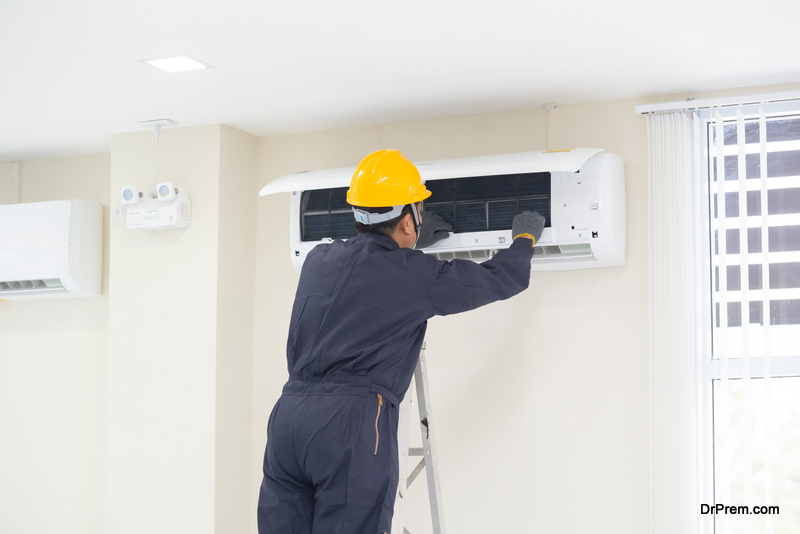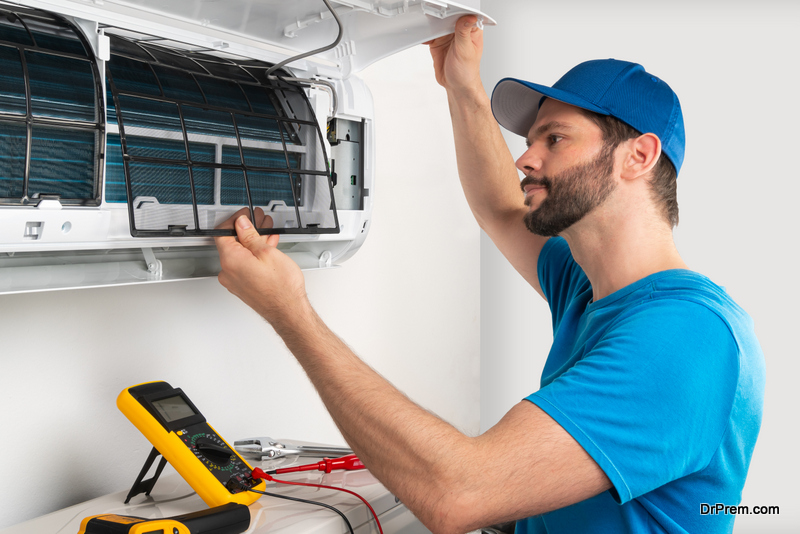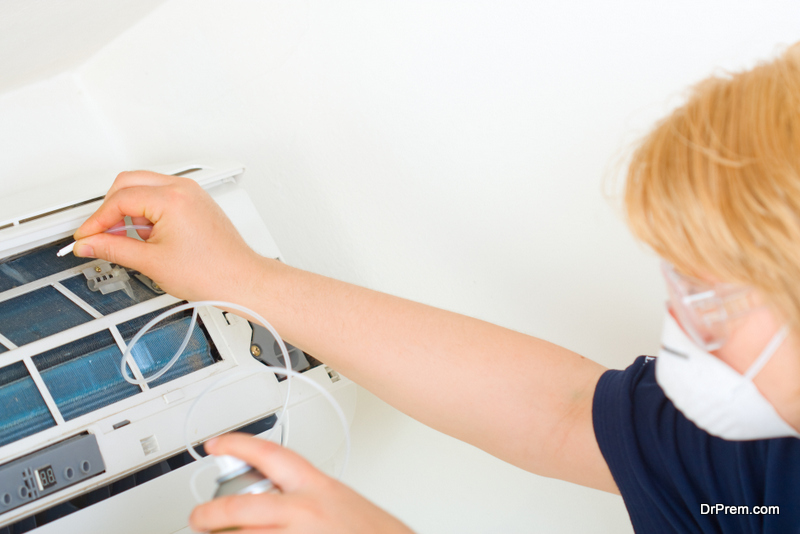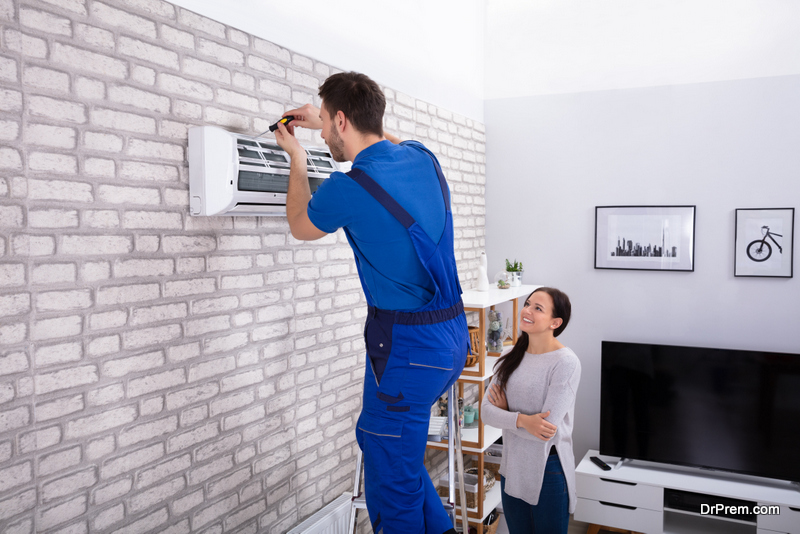In the heat of the summer, you can easily stay cool throughout your home with central air conditioning. However, a window unit can work for small rooms or homes. In either case, staying cool is best when you do not even notice the air conditioner.
However, an air conditioner that runs quietly, reliably, and refreshingly in such a way that you do not even notice it requires regular upkeep in order to keep it running well. To achieve this, you should maintain the filters and coils. However, you should also take seasonal precautions as well. Finally, you should remain vigilant for certain sounds or smells that can provide you with an early warning of potential problems.
1. Filters
 The air filter for any type of air conditioner must be replaced regularly. The frequency for replacing filters is approximately twice per year, according to most HVAC experts. Although some people might opt to vacuum the surface of the filter, this is not advised as the vacuum can cause the filter to deteriorate. Additionally, it will not eliminate all the pollutants caught in the filter, and these pollutants might include mold or mildew.
The air filter for any type of air conditioner must be replaced regularly. The frequency for replacing filters is approximately twice per year, according to most HVAC experts. Although some people might opt to vacuum the surface of the filter, this is not advised as the vacuum can cause the filter to deteriorate. Additionally, it will not eliminate all the pollutants caught in the filter, and these pollutants might include mold or mildew.
For a central unit, you will need to replace the air filters, ensuring the arrows on the filter align properly with the position of the ductwork. It is important to note that HEPA filters work well for people with asthma. However, the increased filtering actually reduces airflow, which might lead to a perceived decrease in cool air. If you do not need medical-grade filtering, a standard air filter will provide you with the best cooling experience.
2. Refrigerant
Central air conditioners rarely need to have the refrigerant changed. However, during an annual inspection, you might have to change the refrigerant if there is a leak due to storms or falling debris.
3. Winterizing
 For a window unit, you should cover the air conditioner while allowing room for the unit to breathe. Doing this can involve placing a breathable mesh over the entire window. It is not advised to wrap the air conditioner such that the unit becomes air tight. Doing so can trap moisture within the case, leading to mildew or mold. For a central unit, you can place a cover over the conditioner, but most units are built to withstand winters.
For a window unit, you should cover the air conditioner while allowing room for the unit to breathe. Doing this can involve placing a breathable mesh over the entire window. It is not advised to wrap the air conditioner such that the unit becomes air tight. Doing so can trap moisture within the case, leading to mildew or mold. For a central unit, you can place a cover over the conditioner, but most units are built to withstand winters.
4. Cleaning
Cleaning a window unit involves removing the air-conditioner, itself, from the casing. Once it is removed, you can gently clean the fins and remove debris. Using canned air to blow dust, debris, and cobwebs will clean the unit without damaging the fins. You should be careful with the fins as they are thin, pliable sections of aluminum that can easily be flattened and damaged.
The fins on a central air conditioner require similar care. You should use a soft-bristle toothbrush to gently reach in between them, but you must take care not to apply too much pressure. You can use a small putty knife to gently extract embedded debris. If you find a bent fin, you should attempt to straighten it to match the surrounding fins. Leaving fins flattened or bent can decrease airflow and damage your air conditioner. Finally, you should use a coil cleaner to actually clean the piping. Coil cleaner will not require rinsing. Instead, it will drip into the drain pan.
With the piping cleaned, you can clean out the drain pan with a water-and-bleach mixture. The mixture should be comprised of half water and half bleach. Once you have the drain pan cleaned, you can wipe it clean and add an algae tablet in the pan to reduce the growth of algae.
5. Blow drying
 Using canned air to blow off the evaporator coil will leave the copper tubing clean and able to cool air properly. If caked-on debris of any kind coats the tubing, you can use a soft-bristled toothbrush to clean the pipes.
Using canned air to blow off the evaporator coil will leave the copper tubing clean and able to cool air properly. If caked-on debris of any kind coats the tubing, you can use a soft-bristled toothbrush to clean the pipes.
6. Leveling
A window unit needs to be off level by about .5 inches. Keeping the air conditioner off level and tilting just a little bit toward the outside area will allow the air conditioner to drain properly. If a window unit is perfectly level, it will pool water. Pooling water can lead to mold or a dank smell. Each season when you clean your unit, you must ensure to position it properly.
However, the condenser for a central air-conditioning unit needs to be level. If the condenser becomes off-kilter, the compressor will experience too much strain and could potentially fail. Although central air conditioners are installed level to the ground, the pad that supports the condenser can compress and lead to poor leveling.
7. Smells and noises
 You should always be aware of any dank smells or subtle knocking from the air conditioner. Dank or dampness can be a sign of mildew or mold, which can be dangerous to breathe. In terms of air conditioning, knocking or other types of noises coming from the unit can be a sign of a faulty compressor. If you hear gurgling, your air conditioner might be leaking refrigerant.
You should always be aware of any dank smells or subtle knocking from the air conditioner. Dank or dampness can be a sign of mildew or mold, which can be dangerous to breathe. In terms of air conditioning, knocking or other types of noises coming from the unit can be a sign of a faulty compressor. If you hear gurgling, your air conditioner might be leaking refrigerant.
Article Submitted By Community Writer




